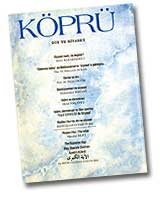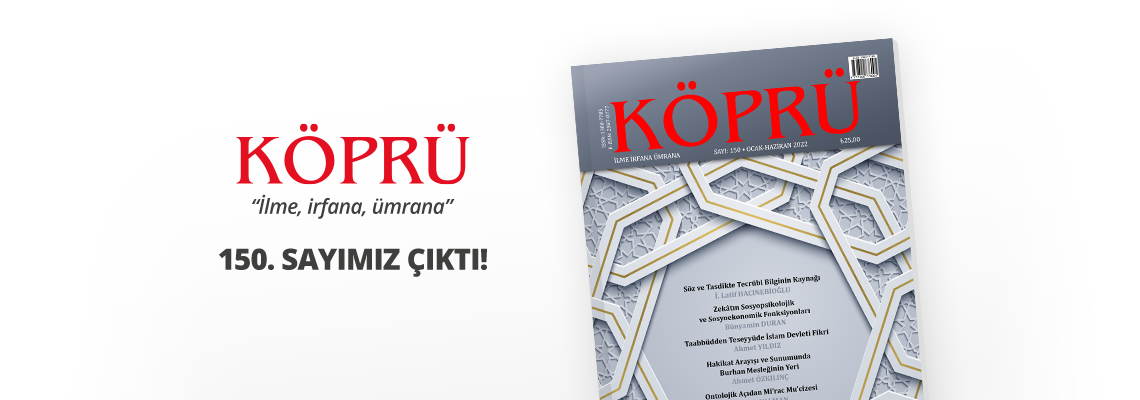Köprü Anasayfa

Din ve Siyaset
"Bahar 95" 50. Sayı
-
The Suprame Sign
Bediüzzaman Said Nursi
The tireless and insatiable traveller, who knew the aim of life in this world and the essence of life to be faith, addressed his own heart and said: “Let us examine the book known as the Qur’an of Miraculous Exposition, which is said to be the word and utterance of the Being Whom we are seeking, the most famous, the most brilliant and wisest book in the world, that issues a challenge in every age to whoever refuses to submit to it. Let us see what it says. But first, we must establish that this book is from our Creator,” and he began to search.
Since the traveller lived in the present age, he looked first at the Risale-i Nur, flashes from the miraculousness of the Qur’an; he saw its one hundred and thirty parts to consist of luminous points drawn from that Book of Discernment, or well-founded explanations of its contents. Even though the Risale-i Nur is valiantly struggling to diffuse the truths of the Qur’an in all directions, in this obstinate and atheistic age, no one can defeat it, which proves that its master, its source, its authority and its sun, is the Qur’an, heavenly not human speech. Among the hundreds of proofs in the different parts of the Risale-i Nur, the single proof contained in the Twenty-Fifth Word and the end of the Nineteenth Letter, establishes forty aspects of the Qur’an’s miraculousness in such a way that whoever sees it, far from uttering any criticism or objection, admires its arguments, and utters appreciative praise. The traveller left it to the Risale-i Nur to prove that the Qur’an is miraculous and the true Word of God, turning only to a brief indication of a few points showing its greatness.
First Point: Just as the Qur’an, with all its miracles and truths indicating its veracity is a miracle of Muhammad (Peace and blessings be upon him) so too, Muhammad (Peace and blessings be upon him) with all his miracles, proofs of prophethood and perfections of knowledge, is a miracle of the Qur’an and a decisive proof of the Qur’an’s being the Word of God.
Second Point: The Qur’an, in this world, brought about in so luminous, felicitous and truthful a fashion, a revolution in the social life of man, as well as in the souls, hearts, spirits, and intellects of men, in their individual, social, and political lives, and having caused this revolution perpetuated it in such a fashion, that for fourteen centuries at every moment its six thousand, six hundred and sixty-six verses have been read by the tongues of more than a hundred million men, training them, refining their souls and purifying their hearts. To spirits, it has been a means of development and advancement; to intellects, an orientation and light; to life, it has been life itself and felicity. Such a book is of a certainty unparalleled; it is a wonder, a marvel, and a miracle.
Third Point: The Qur’an, from that age down to the present, has demonstrated such eloquence that it caused the value attached to the odes known as “Seven Hanging Poems” that were written in gold on the walls of the Ka‘ba to descend to such a point that the daughter of Labid, when taking down her father’s poem from the Ka‘ba, said, “Compared with the verses of the Qur’an, this no longer has any value.”
A bedouin poet heard this verse being recited,
Therefore expound openly what you are commanded,
and immediately prostrated. They asked him: “Have you become a Muslim?” “No,” he replied, “I was prostrating before the eloquence of this verse.”
Thousands of scholars and litterateurs, like geniuses of the science of rhetoric such as ‘Abd al-Qahir Jurjani, Sakkaki, and Zamakhshari, have unanimously decided that the eloquence of the Qur’an is beyond human capacity and is unattainable.
The Qur’an has also from that time forward invited to the field of combat all arrogant and egoistic litterateurs and rhetoricians, and said to them in a manner calculated to break their arrogance: “Come, produce a single sura like it, or else accept perdition and humiliation in this world and the hereafter.” Despite this challenge, the obstinate rhetoricians of that age abandoned the short path of producing a single sura like the Qur’an, and instead chose the long path of casting their persons and property into danger. This proves that the short path cannot be taken.
Millions of Arabic books are in circulation, some written by friends of the Qur’an in order to resemble and imitate it, others written by its enemies in order to confront and criticize it. Not one of them has been able to attain the level of the Qur’an. Should a common man even listen to them, he is sure to say: “The Qur’an does not resemble these other books, nor is it in the same class as they. It must be either below them or above them.” No one —no unbeliever or fool— in the world can say that it is below them. Hence its degree of eloquence is above all of them. Once a man read the verse,
All that is in the heavens and the earth extols and glorifies God.
He said: “I cannot see any miraculous eloquence in this verse.” He was told: “Go back to that age like the traveller, and listen to the verse as recited there.” Imagining himself to be there before the revelation of the Qur’an, he saw that all the beings in the world were living in an unstable, transient world in empty, infinite and unbounded space, in confusion and darkness, lifeless and without consciousness and purpose. Suddenly he heard this verse proclaimed by the tongue of the Qur’an and the verse removed a veil from in front of the universe and illumined the face of the globe; this pre-eternal speech, this eternal decree, gave instruction to all conscious beings, drawn up in the ranks of succeeding centuries, in such fashion that the cosmos became like a vast mosque. All of creation headed by the heavens and the earth, was engaged in vital remembrance of God and proclamation of His glory, was joyously and contentedly fulfilling its function.
All of this our traveller observed. Thus tasting the degree of the eloquence of the Qur’an, and comparing the other verses to it by analogy, he understood one of the many thousands of wise reasons for the conquest of half the globe and a fifth of humanity by the eloquent murmuring of the Qur’an, for the uninterrupted continuance of its respected and magnificent monarchy for fourteen centuries.
Fourth Point: The Qur’an has demonstrated such a veracious sweetness that whereas the repetition of even the sweetest thing induces disgust, it has from earliest times been accepted by everyone and even become proverbial that repeated recitation of the Qur’an, far from inducing disgust and weariness in men of sound heart and pure taste, on the contrary increases its sweetness.
The Qur’an demonstrates, moreover, such a freshness, youth and originality, that even though it has lived for fourteen centuries and passed through many hands, it retains its freshness as if it had only just been revealed. Every century sees the Qur’an enjoying a new youth, as if it were addressing that century in particular. Similarly, scholars of every branch of learning, even though they keep the Qur’an constantly at their side in order to benefit from it, and perpetually follow its method of exposition, see that the Qur’an maintains the originality of its style and manner of explanation.
Fifth Point: One wing of the Qur’an is in the past, and one is in the future, and like its root and one wing are the agreed truths of the former prophets, and it confirms and corroborates them, and they too confirm it with the tongue of unanimity, so too all the true Sufi paths and ways of sainthood whose fruits like the saints and purified scholars, who receive life from the Qur’an, show through their vital spiritual progress that their blessed tree is living, effulgent, and the means to truth, and who grow and live under the protection of its second wing, testify that the Qur’an is pure truth and the assembly of truths and in its comprehensiveness, a matchless wonder.
-
Din ve Siyaset
Editör
Yazıyı okumak için tıklayınız... -
Siyaset Nedir? Ne Değildir?
Metin Karabaşoğlu
Yazıyı okumak için tıklayınız... -
"Direnme Hakkı" ve Bediüzzaman'ın "siyaset"e yaklaşımı
Bünyamin Duran
Yazıyı okumak için tıklayınız... -
Devlet ve Din
Niyazi Öktem
Yazıyı okumak için tıklayınız... -
Mânâ-yı harfi ile siyaset
Hakan YALMAN
Yazıyı okumak için tıklayınız... -
Bediüzzaman ve Siyaset
Muhammed Bozdağ
Yazıyı okumak için tıklayınız... -
Din, siyaset ve nefis üzerine
İsmail TÜRKMEN
Yazıyı okumak için tıklayınız... -
İslâm ve Demokrasi
Mesut Toplayıcı
Yazıyı okumak için tıklayınız... -
Raşid Gannuşi ile söyleşi
Yazıyı okumak için tıklayınız... -
Risale-i Nur'da Din ve Siyaset
Bediüzzaman Said Nursi
Yazıyı okumak için tıklayınız... -
Risale-i Nur: The Tefsir
Mücahid BİLİCİ
Yazıyı okumak için tıklayınız... -
The Suprame Sign
Bediüzzaman Said Nursi
Yazıyı okumak için tıklayınız... -
Das Oberste Zeichen
Bediüzzaman Said Nursi
Yazıyı okumak için tıklayınız... -
Ayetü'l-Kübrâ
Bediüzzaman Said Nursi
Yazıyı okumak için tıklayınız...
